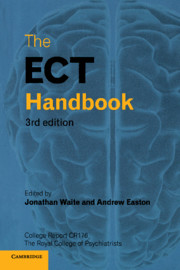Book contents
- Frontmatter
- Contents
- Abbreviations
- List of figures, tables and boxes
- List of contributors
- Preface
- Introduction: the role of ECT in contemporary psychiatry: Royal College of Psychiatrists’ Special Committee on ECT and Related Treatments
- 1 Mechanism of action of ECT
- 2 The ECT suite
- 3 Anaesthesia for ECT
- 4 ECT prescribing and practice
- 5 Psychotropic drug treatment during and after ECT
- 6 Monitoring a course of ECT
- 7 Non-cognitive adverse effects of ECT
- 8 Cognitive adverse effects of ECT
- 9 Dental issues related to ECT
- 10 Training, supervision and professional development: achieving competency
- 11 Nursing guidelines for ECT
- 12 Inspection of ECT clinics
- 13 Other brain stimulation treatments
- 14 The use of ECT in the treatment of depression
- 15 The use of ECT in the treatment of mania
- 16 The use of ECT in the treatment of schizophrenia and catatonia
- 17 The use of ECT in neuropsychiatric disorders
- 18 The use of ECT in people with intellectual disability
- 19 Safe ECT practice in people with a physical illness
- 20 ECT for older adults
- 21 The use of ECT as continuation or maintenance treatment
- 22 Consent, capacity and the law
- 23 Patients’ and carers’ perspectives on ECT
- Appendix I Out-patient declaration form
- Appendix II ECT competencies for doctors
- Appendix III Example of a job description for an ECT nurse specialist
- Appendix IV Example of a job description for an ECT nurse/ECT coordinator
- Appendix V Information for patients and carers
- Appendix VI Example of a consent form
- Appendix VII Useful contacts
- Appendix VIII Example of a certificate of incapacity
- Index
Appendix II - ECT competencies for doctors
Published online by Cambridge University Press: 02 January 2018
- Frontmatter
- Contents
- Abbreviations
- List of figures, tables and boxes
- List of contributors
- Preface
- Introduction: the role of ECT in contemporary psychiatry: Royal College of Psychiatrists’ Special Committee on ECT and Related Treatments
- 1 Mechanism of action of ECT
- 2 The ECT suite
- 3 Anaesthesia for ECT
- 4 ECT prescribing and practice
- 5 Psychotropic drug treatment during and after ECT
- 6 Monitoring a course of ECT
- 7 Non-cognitive adverse effects of ECT
- 8 Cognitive adverse effects of ECT
- 9 Dental issues related to ECT
- 10 Training, supervision and professional development: achieving competency
- 11 Nursing guidelines for ECT
- 12 Inspection of ECT clinics
- 13 Other brain stimulation treatments
- 14 The use of ECT in the treatment of depression
- 15 The use of ECT in the treatment of mania
- 16 The use of ECT in the treatment of schizophrenia and catatonia
- 17 The use of ECT in neuropsychiatric disorders
- 18 The use of ECT in people with intellectual disability
- 19 Safe ECT practice in people with a physical illness
- 20 ECT for older adults
- 21 The use of ECT as continuation or maintenance treatment
- 22 Consent, capacity and the law
- 23 Patients’ and carers’ perspectives on ECT
- Appendix I Out-patient declaration form
- Appendix II ECT competencies for doctors
- Appendix III Example of a job description for an ECT nurse specialist
- Appendix IV Example of a job description for an ECT nurse/ECT coordinator
- Appendix V Information for patients and carers
- Appendix VI Example of a consent form
- Appendix VII Useful contacts
- Appendix VIII Example of a certificate of incapacity
- Index
Summary
The trainee by year 3 ought to be able to administer ECT without direct supervision, prepare patients for ECT, and explain to patients and relatives about ECT, its indications and broad place within psychiatric treatment. Trainees ought to be able to monitor a patient's mental state and cognitive functioning during a course of ECT.
Consultants and trainees by the end of year 6 ought to have a good understanding of the place of ECT in modern clinical practice sufficient to obtain informed consent from patients to reach level 1 competency. Only consultants responsible for the ECT clinic or specialist trainees (ST4–6) with an interest in the administration of ECT would be expected to have level 1 competency in the practical aspects of the administration of ECT (sufficient to run an ECT clinic).
Name:
1 Fully conversant (FC)
2 Working knowledge (WK)
3 Awareness (A)
Verbally assessed
1 FC Is able to explain accurately all the important features to a standard that shows sufficient understanding that would allow them to competently and independently apply the knowledge.
2 WK Is able to explain the key features to a standard that shows sufficient understanding that would allow them to apply the knowledge in common situations and access further information if necessary.
3 A Is aware of the topic and knows where to get further information but not to a level that provides a WK.
Observed
1 FC Is able to carry out the procedure to a standard that shows sufficient skill and understanding that would allow them to competently and independently carry it out.
2 WK Is able to carry out the procedure to a standard that shows sufficient skill and understanding that would allow them to carry it out in usual situations but to know their limitations and access further help if necessary.
3 A Is aware of the topic and knows where to get further information but not to a level that provides a WK.
- Type
- Chapter
- Information
- The ECT Handbook , pp. 231 - 235Publisher: Royal College of PsychiatristsPrint publication year: 2013



